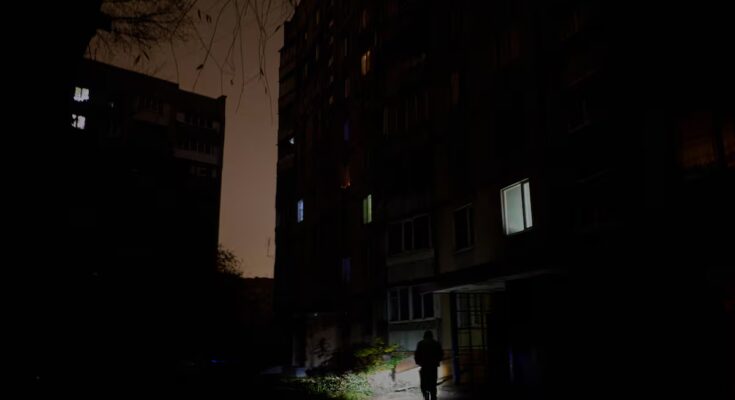Robert Brovdi, commander of the drone divisions of the Ukrainian Armed Forces, is not only famous for his military successes, but also for his bravado. On November 1, on his social media, Brovdi ironically warned Russians to prepare to live in darkness: “Blackouts aren’t scary. They’re just a little inconvenient… birds of the Drone Systems Forces, along with Ukraine’s other long-range capabilities, promise the Russians a rapid, if somewhat forced, adaptation.” Brovdi’s message came just hours after a Ukrainian bombing attack left the town of Yukovski, on the outskirts of Moscow, without electricity.
Ukrainian cities are suffering another year of widespread power outages due to Russian attacks on the electricity grid. The blackouts are daily and last from four to eight hours. Although there are worse days: this Saturday, after a Russian bombardment with 25 ballistic missiles and more than 450 bomb drones, Kiev remained without electricity for more than 12 hours. The Centrenergo company, one of the main electricity producers in Ukraine, confirmed that the operation of its two thermoelectric power plants has been completely stopped.
The population has become accustomed to the darkness, but in the cold months the inconveniences go further: if the blackout is particularly prolonged, water pumping is interrupted, as is the heating system or mobile phone coverage, because the antennas that amplify the signal are no longer able to work.
“If they want to leave us without electricity, they must understand that we will do the same,” Volodymyr Zelensky said on October 8. The Ukrainian president said, as Brovdi did last November, that Moscow should above all be the place “where Russians feel the consequences of this war.” Zelensky’s comments came a day after an attack on the electricity system in Russia’s Belgorod province knocked out electricity supplies and internet connections to 40,000 homes.
It hits every day
Belgorod is a Russian region bordering Ukraine. Russian provinces closest to the battlefield, such as Belgorod, are the most affected by Ukrainian retaliation, albeit without suffering the massive scale of blackouts that the invaded country suffers from. At dawn on the 2nd, Ukrainian drones destroyed an electrical substation in nearby Kursk province. A thermoelectric power plant in the town of Oriol, 170 kilometers from the border, was also damaged that night, Brovdi said in a statement. In total, according to their version, five electrical substations were destroyed that morning.
The same thing happened again on the following mornings. Russian regional authorities confirmed three blackouts in thousands of homes in the Kursk and Volgograd provinces of southern Russia last day after Ukrainian drones fell on electricity substations. The next day, energy plants in Vladimir province, east of Moscow (650 kilometers from the Ukrainian border), and a thermoelectric power plant in Oryol province were targeted.
The latest Ukrainian attack occurred last Sunday when it targeted a high-voltage grid in Taganrog, a Russian city adjacent to Donetsk province, leaving entire neighborhoods of the municipality without electricity supply. Early Sunday morning, Russian media reported that Ukrainian missiles hit a power plant in the city of Voronezh.
Even though the Ukrainian response was less in terms of damage and human casualties than the Russian one, the tit-for-tat logic raises questions about the laws of war. Both Kiev and the European Union have insisted from 2022 that Russia’s strategy of leaving the civilian population without electricity or minimal services is a war crime. The Geneva Convention makes the use or destruction of civilian infrastructure as a weapon a crime. For example, the Ukrainian Foreign Ministry warned in an October 31 statement that Russia had attacked power plants that jeopardized the safety of its atomic facilities: “Deliberate attacks on civilian energy infrastructure that directly affect nuclear facilities bear the mark of nuclear terrorism and constitute a serious violation of international human law.”
Ukraine’s Western allies avoid commenting on Ukrainian strategy. Only in April 2024, during the first Ukrainian bombing campaign against Russian oil refineries and gas centers, did Joe Biden’s White House raise its voice because it believed that the Ukrainian strategy could destabilize the international oil market. Celeste Wallander, US Undersecretary of Defense, went further during an April 2024 congressional appearance: “We are concerned about the issue of attacks on critical infrastructure when it comes to civilian targets, because Ukraine is committed to the highest standards of respect for the laws of armed conflict, and that is one of the elements of being a European democracy.”
A year and a half later, Ukrainian drones hit the Russian hydrocarbon industry even harder. The objective is to damage its capacity to export gas and oil (the main source of income for the state and, therefore, for its war machine), as well as causing an increase in the price of fuel for the population.
Brovdi units, the drones of the intelligence services of the Ministry of Defense of Ukraine (GUR) and the Security Services of Ukraine (SSU) are the three legs of Ukrainian air power that effectively strike the Russian oil and gas industry on a daily basis, including with attacks 2,000 kilometers from its borders. “It’s pure mathematics, our attacks are having more impact than sanctions,” GUR head General Kirilo Budanov said on October 16.
Only last spring was there a lull in the exchange of these long-range bombings. Russian President Vladimir Putin announced in March a temporary halt to attacks on Ukraine’s electricity production centers, a move agreed with US President Donald Trump.
Kiev, for its part, agreed to halt its long-range drones targeting the Russian energy industry. The agreement was tacitly maintained until last August when a new offensive was activated, the harshest in almost four years of war, against enemy oil and gas. Russia responded this fall by activating a periodic campaign to destroy the invaded country’s electricity and gas grids. The result is that the noise of diesel generators is once again the soundtrack of war in the streets across Ukraine.



